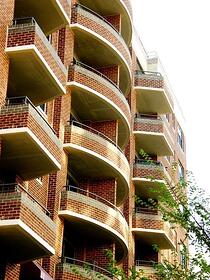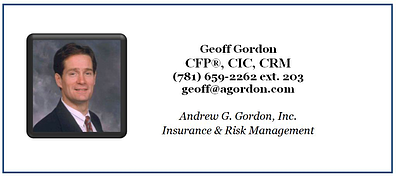- 781-659-2262

Condominium insurance is a unique kind of insurance that integrates the interests of a condominium association with the interests of the individual unit owners. Even though each unit owner has a proportional interest in the association, unit owners do have distinct and separate interests from those of the association.
Because insurance usually follows ownership, the ownership boundary between what the association owns and the unit owner owns is an important detail. Ownership is normally defined in the Master Deed. Here are two broad categories that we see today.
The condominium structure commonly known as "all-in" includes everything right to the interior coat of paint inside the condominium units. This “all-in” approach typically will include additions or alterations that a unit owner makes, such as adding new cabinets, alarm system, chandeliers, and so forth, provided the unit owner alerts the Association to these additional values. The Association is then responsible for providing insurance for everything that is permanently attached within the condominium structure. A simple way of visualizing this concept is to imagine picking up and turning the whole building upside down, and shaking it. Everything that falls out, such as furniture and other personal property, is the responsibility of the unit owner. Everything that stays attached to the structure is insured by the association policy.
The “bare walls” approach means the bare walls of the building, and leaves a greater responsibility on individual unit owners to insure their portion of the “structure,” In the Master Deed, the “bare walls” approach uses wording such as “on the plane of the interior studs,” or “the plane of the lower side of the roof rafters,” or ”the top surface of the sub-flooring.” This means that the unit owner owns - and is responsible for - the drywall, wallpaper, paint, ceiling, flooring, and should insure these items on their own unit-owner policy (known in insurance lingo as an HO-6). Even bathtubs, toilets, sinks, kitchen cabinets and counter-tops may not be covered by the association's insurance.
Remember, insurance usually follows ownership. Under "bare walls, the association insures only the shell structure plus common mechanicals such as heating systems, common plumbing, and common electrical; the rest is the unit owner’s responsibility.
Master deeds aren't always written on a 100% "all-in" vs 100% "bare-walls" basis. Often there are shades of gray. Some master deeds with an all-in basis exclude betterments & improvements (e.g., upgraded lighting fixtures or cabinetry would not be covered).
Many insurance carriers now offer a work-around to an association with a 'bare-walls' master deed who want all-in coverage: an endorsement that says, forget who owns what, we (the insurance company) agree to insure the building(s) on an "all-in" basis. The amount of insurance will be higher because they're insuring all those interior walls, and there may be a charge for the endorsement as well, but this is a good solution if most unit owners don't want the responsibility of insuring the interior walls, ceilings and floors of their units with their own insurance.
The downside is that more claims will accrue to the association policy. Being commercial insurance,this insurance is much more sensitive to claims history. A few claims will drive up the cost of insurance for the whole association substantially.
The biggest insurance problems occur when there is a master deed and insurance that calls for "bare walls" insurance, but unit owners do not know that it is their responsibility to insure their portion of the building individually. When this happens and there is damage to interior walls, such as water damage from storms or plumbing problems in upper floors, there is no insurance in either policy for the interior walls. Depending upon the size and build within individual units, this can be significant value that unit owners self-insure by default, without even knowing.
Another problem occurs when a condominium association insures its building based on a “bare walls” replacement estimate, but the deed calls for “all-in” coverage. The result is severely underinsured values. Valuations for “bare walls” condo buildings typically run 30 to 40% less than valuations for similar sized "all-in" policies because of the cost of finish work and interior walls. Imagine if you were handed the keys to your newly rebuilt unit, only to find rough plywood floors, studs for walls, and only joists for a ceiling. Review your master deed for ownership specifics, or work with a broker like Gordon Atlantic Insurance who can help plan around these things.
Management of the association can directly affect the cost of insurance, as attention to general conditions and safety concerns affect potential losses. Because every association is managed uniquely, and because attention to these details affects losses over the long run, insurance underwriters pay close attention to loss history with condominiums. Unit owners prefer to have an association assume condominium losses, rather than file their own claims; just as condos associations prefer to have unit owners insurance pay claims.. So, even though insurance generally follows ownership, there may be pressure to have associations assume losses.
Because of these issues, we usually recommend associations use high deductibles, self-insuring smaller losses to avoid these losses from affecting insurance claims experience. When associations have more skin in the game, attention to loss prevention is heightened, lowering the long term cost of risk. With condo associations greater than four units, insurance companies usually will want to review condominium association financials to ensure the ability to pay for these smaller claims.
Even when claims experience is good, insurance company initial inspection is rigorous. Talk to us about conditions before the insurance inspector shows up. The most attractive pricing is reserved for the best-maintained (perfect) places.
See our other blogs and whiteboard videos for more on how individual unit owners can address their interests as they may deviate from association interests and association management’s lack of understanding of some of these nuances.
If you have any further questions, contact us by clicking the buttons below.

We are local insurance experts serving the South Shore for over 70 years.
Click below to get a free quote for your personal or business insurance.